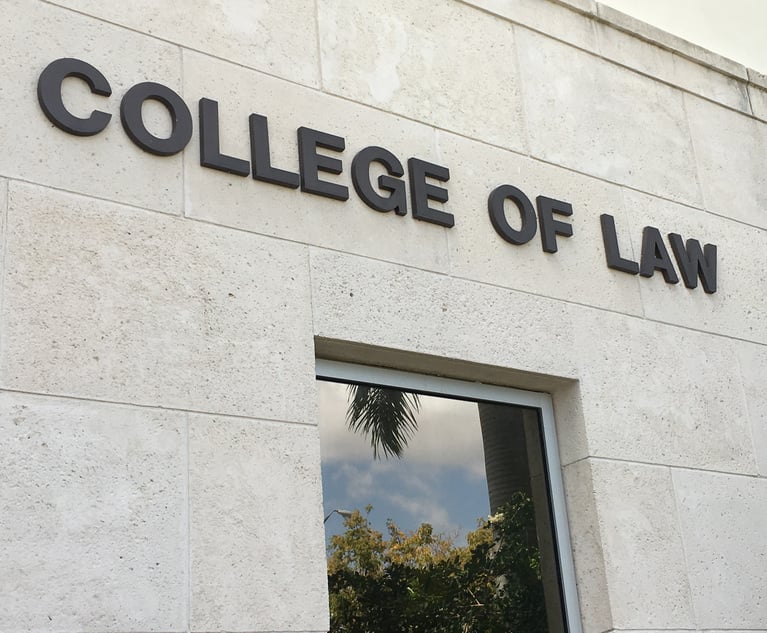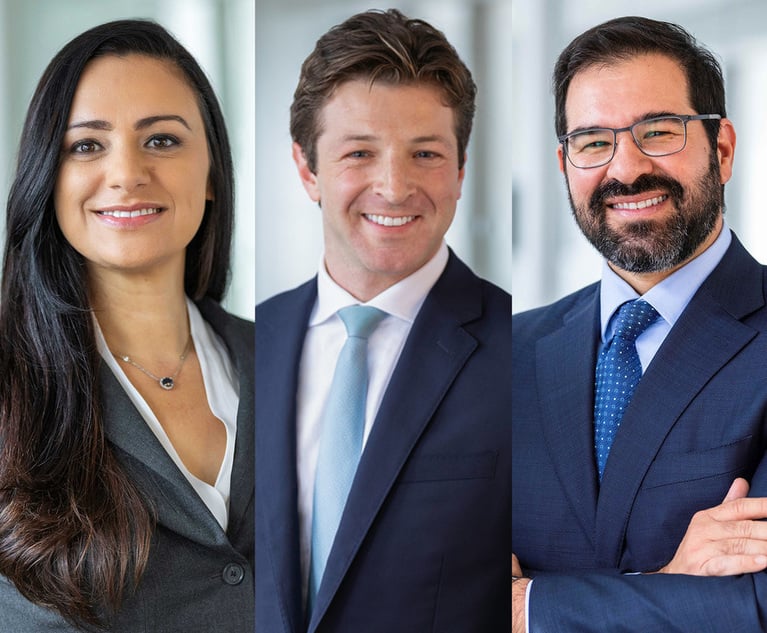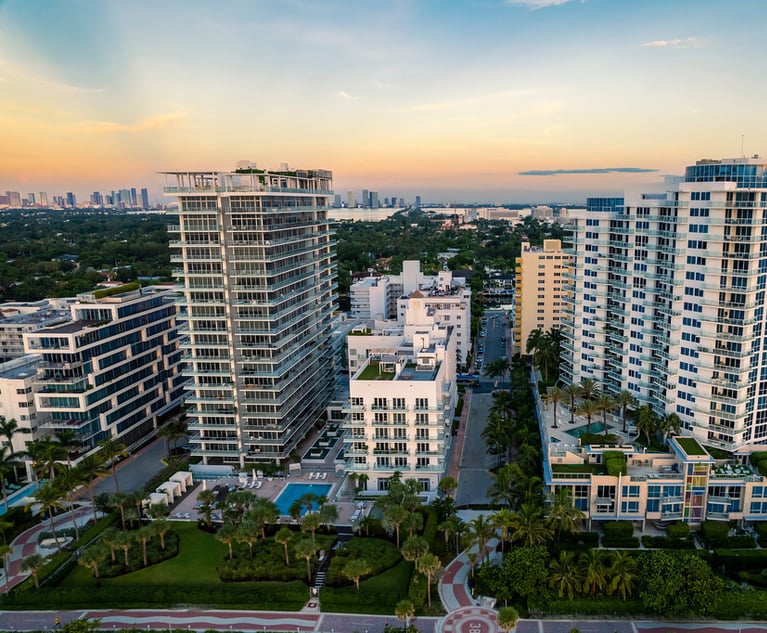2 Florida Law Schools Among 10 Sanctioned by ABA for Lax Admissions
Two private law schools in Florida have been disciplined in little more than a year for enrolling students who the American Bar Association believes are unlikely to graduate and pass the bar.
November 21, 2017 at 04:21 PM
5 minute read
The original version of this story was published on Law.com
Two Florida law schools are among 10 disciplined by the American Bar Association since August 2016 for enrolling students who it says are unlikely to graduate and pass the bar — an unprecedented crackdown since such actions historically are rare.
The sanctions issued by the ABA's Council of the Section of Legal Education and Admissions to the Bar range from letters of noncompliance setting out remedial plans to censure to probation.
Based on a search of the public notices posted on its website, the ABA has found that the campuses failed to comply with some or all of the accreditation requirements that schools: “maintain sound admissions policies;” “maintain a rigorous program of legal education that prepares its students, upon graduation, for admission to the bar and for effective, ethical, and responsible participation as members of the legal profession;” “provide academic support designed to afford students a reasonable opportunity to complete the program of legal education, graduate and become members of the legal profession;” and not “admit an applicant who does not appear capable of satisfactorily completing its program of legal education and being admitted to the bar.”
The schools are: Appalachian School of Law in Grundy, Virginia, Arizona Summit Law School in Phoenix, Ave Maria School of Law in Naples, Florida, Charlotte Law School (now closed), Cooley Law School in Lansing, Michigan, Florida Coastal School of Law in Jacksonville, Atlanta's John Marshall Law School, Thomas Jefferson School of Law in San Diego, Thurgood Marshall School of Law at Texas Southern University in Houston and Valparaiso University Law School in Valparaiso, Indiana. Some schools have since been found to be in compliance, in whole or in part, and had the sanction removed.
Nearly half of these are controversial for-profit institutions: Arizona Summit, Charlotte, Florida Coastal and John Marshall have been scrutinized for enrolling students who incur large amounts of student debt while failing to pass the bar and secure gainful employment in the legal profession.
A law school remains accredited by the ABA throughout this disciplinary process, said Barry Currier, the ABA's managing director of accreditation and legal education. Depending on the type of discipline imposed, the schools have various opportunities to come into compliance with the rules, he said. The ABA examined the schools' Law School Admission Test scores and undergraduate grades of admitted students, bar passage rates and academic support programs when reaching its conclusions.
Currier attributed the disciplinary actions to widespread changes in legal education over the past seven or so years, namely the national decline in applicants. If schools were already challenged in meeting the ABA's admissions standards in 2010, then they are even more so today in light of the declining number and quality of applicants, he said.
“It is logical to ask these schools to demonstrate that the students who are coming into their programs have a reasonable likelihood of success with academics and on the licensing or bar exam, and that the schools have programs to maximize the students' likelihood of success,” Currier said in an email message.
“Given our current processes, some of the matters that have recently come to a head actually began some time ago as a result of changing market forces.”
Scott DeVito, dean of Florida Coastal, which last month received a letter of noncompliance, said the school has greatly increased its incoming credentials and is continuing to do so in the upcoming year, leaving DeVito, he wrote in an email, to “believe that Florida Coastal is currently fully compliant with” the standard governing admissions. In addition, DeVito noted the school is compliant with the ABA's bar passage rate standard even though its pass rate on last summer's Florida exam was 47.7 percent, according to the state's Board of Bar Examiners.
ALM reached out to the deans of the law schools, with the exceptions of Valparaiso, which earlier this month had its sanction of public censure removed, and Charlotte, which has since closed. Four of the deans, including DeVito, provided comments.
Kevin Cieply, president and dean of Ave Maria, said in an email that the council in March found the school in compliance with one of the admissions standards, and he last week submitted a report to the ABA outlining its case that it is now in compliance with the other standard it was found to have violated.
Joan Bullock, dean of Thomas Jefferson, which last week was notified that the council voted earlier this month to place it on probation, said in a statement that the school has a “strong track record of producing successful graduates,” noting its more than 7,000 national and international alumni who currently practice law in a variety of settings.
“They are excellent contributors to the legal community and provide much-needed service to the community at large,” Bullock said. “While we are disappointed with the council's decision, we are addressing the ABA's concerns.”
Don Lively, dean of Arizona Summit, which was placed on probation in March, acknowledged that while the school's recent bar passage rate has been “weak,” it has taken necessary steps to improve it.
“It also is worth noting that three out of every four students at our school eventually have passed a bar examination (and at times we have led a state that has two first-tier law schools) — despite having a significantly lower LSAT profile,” Lively wrote in an e-mail.
This content has been archived. It is available through our partners, LexisNexis® and Bloomberg Law.
To view this content, please continue to their sites.
Not a Lexis Subscriber?
Subscribe Now
Not a Bloomberg Law Subscriber?
Subscribe Now
NOT FOR REPRINT
© 2025 ALM Global, LLC, All Rights Reserved. Request academic re-use from www.copyright.com. All other uses, submit a request to [email protected]. For more information visit Asset & Logo Licensing.
You Might Like
View All
Florida Law Schools Are Seeing a Bump in Applications for 2025, After Recent Declines at Flagship Schools
3 minute read
Florida Judge Denies Motion to Dismiss in $150M Plane Crash Lawsuit Involving Flow La Movie
3 minute read
Trending Stories
- 1States Accuse Trump of Thwarting Court's Funding Restoration Order
- 2Microsoft Becomes Latest Tech Company to Face Claims of Stealing Marketing Commissions From Influencers
- 3Coral Gables Attorney Busted for Stalking Lawyer
- 4Trump's DOJ Delays Releasing Jan. 6 FBI Agents List Under Consent Order
- 5Securities Report Says That 2024 Settlements Passed a Total of $5.2B
Who Got The Work
J. Brugh Lower of Gibbons has entered an appearance for industrial equipment supplier Devco Corporation in a pending trademark infringement lawsuit. The suit, accusing the defendant of selling knock-off Graco products, was filed Dec. 18 in New Jersey District Court by Rivkin Radler on behalf of Graco Inc. and Graco Minnesota. The case, assigned to U.S. District Judge Zahid N. Quraishi, is 3:24-cv-11294, Graco Inc. et al v. Devco Corporation.
Who Got The Work
Rebecca Maller-Stein and Kent A. Yalowitz of Arnold & Porter Kaye Scholer have entered their appearances for Hanaco Venture Capital and its executives, Lior Prosor and David Frankel, in a pending securities lawsuit. The action, filed on Dec. 24 in New York Southern District Court by Zell, Aron & Co. on behalf of Goldeneye Advisors, accuses the defendants of negligently and fraudulently managing the plaintiff's $1 million investment. The case, assigned to U.S. District Judge Vernon S. Broderick, is 1:24-cv-09918, Goldeneye Advisors, LLC v. Hanaco Venture Capital, Ltd. et al.
Who Got The Work
Attorneys from A&O Shearman has stepped in as defense counsel for Toronto-Dominion Bank and other defendants in a pending securities class action. The suit, filed Dec. 11 in New York Southern District Court by Bleichmar Fonti & Auld, accuses the defendants of concealing the bank's 'pervasive' deficiencies in regards to its compliance with the Bank Secrecy Act and the quality of its anti-money laundering controls. The case, assigned to U.S. District Judge Arun Subramanian, is 1:24-cv-09445, Gonzalez v. The Toronto-Dominion Bank et al.
Who Got The Work
Crown Castle International, a Pennsylvania company providing shared communications infrastructure, has turned to Luke D. Wolf of Gordon Rees Scully Mansukhani to fend off a pending breach-of-contract lawsuit. The court action, filed Nov. 25 in Michigan Eastern District Court by Hooper Hathaway PC on behalf of The Town Residences LLC, accuses Crown Castle of failing to transfer approximately $30,000 in utility payments from T-Mobile in breach of a roof-top lease and assignment agreement. The case, assigned to U.S. District Judge Susan K. Declercq, is 2:24-cv-13131, The Town Residences LLC v. T-Mobile US, Inc. et al.
Who Got The Work
Wilfred P. Coronato and Daniel M. Schwartz of McCarter & English have stepped in as defense counsel to Electrolux Home Products Inc. in a pending product liability lawsuit. The court action, filed Nov. 26 in New York Eastern District Court by Poulos Lopiccolo PC and Nagel Rice LLP on behalf of David Stern, alleges that the defendant's refrigerators’ drawers and shelving repeatedly break and fall apart within months after purchase. The case, assigned to U.S. District Judge Joan M. Azrack, is 2:24-cv-08204, Stern v. Electrolux Home Products, Inc.
Featured Firms
Law Offices of Gary Martin Hays & Associates, P.C.
(470) 294-1674
Law Offices of Mark E. Salomone
(857) 444-6468
Smith & Hassler
(713) 739-1250








